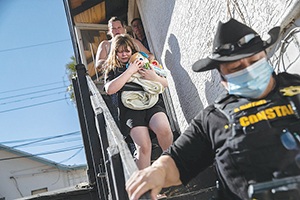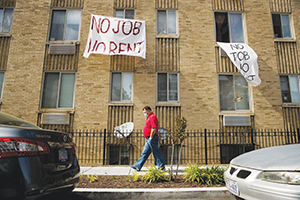By LISA EISENHAUER
CHA and other housing advocates worry that once a federal eviction moratorium in place for most of the COVID-19 pandemic is lifted, the nation's housing crisis will hit a new peak.

A Maricopa County, Arizona, constable escorts a family out of their apartment after serving an eviction order for nonpayment of rent on Sept. 30 in Phoenix. With millions of Americans still unemployed due to the pandemic, the expiration of the federal moratorium on evictions looms large for renters and landlords alike.
John Moore/Getty Images
The advocates say that government relief efforts have kept many individuals and families housed during the public health emergency. They are urging various additional remedies, including quick implementation of financial assistance and programs that are part of the American Rescue Plan, the massive relief package signed in mid-March by President Joe Biden.
Sr. Mary Haddad, RSM, president and chief executive officer of CHA, says that legislation will provide much-needed assistance to those lacking health care or in need of housing aid.
"The American Rescue Plan represents one of the most significant steps in expanding access to health care and combatting child poverty in our nation's history," Sr. Mary says.
Diane Yentel, president and chief executive of the National Low Income Housing Coalition, told an MSNBC interviewer that the housing assistance in the relief package is a significant starting point.

Signs that read "No Job No Rent" hang from the windows of an apartment building during the coronavirus pandemic in Northwest Washington in May. The pandemic has prompted authorities around the U.S. to initiate policies protecting renters from eviction.
AP Photo/Andrew Harnik
"This is really a historic amount of resources to help provide some housing stability for renters, for homeowners, for some people experiencing homelessness, but much more will be needed to address the underlying shortage of affordable homes that existed before the pandemic and will exist after the pandemic," Yentel says in the televised interview.
The moratorium on ousting tenants who are unable to afford rent originated in the CARES Act relief package signed into law in spring 2020. That 120-day pause ended in July but was renewed later in the summer by order of the Centers for Disease Control and Prevention. The agency says its intent was to slow the spread of the virus by keeping people safely housed. The CDC moratorium was set to expire Jan. 31, however the Biden administration pushed that back to March 31 and then to June 30.
Two federal judges in Ohio and one in Texas have ruled against the moratorium. Those decisions are facing appeals.
In a March 26 letter to the CDC director, Sr. Mary of CHA joined Archbishop Paul S. Coakley of Oklahoma City, chairman of the U.S. bishops' Committee on Domestic Justice and Human Development, and Sr. Donna Markham, OP, president and chief executive of Catholic Charities USA, in asking that the moratorium be kept in place until the end of the pandemic.
"We also urge you to strengthen the moratorium so that it is automatic and universal, closes loopholes in the moratorium's protections, and enforces those protections," the letter says.
The National Low Income Housing Coalition, a nonprofit focused on finding housing solutions for the poorest Americans, says the federal moratoriums and similar orders by states have protected millions of renters who otherwise might have been forced out of their homes.
CHA is among dozens of organizations that have signed on to the coalition's Opportunity Starts at Home campaign. Other supporters include CommonSpirit Health and Catholic Charities USA.
In a letter to the CDC director in December, the supporters of the campaign also have called for extending the moratorium through the duration of the pandemic. The letter cited a study indicating that the brief lapse in the moratorium over the summer "led to more than 400,000 more COVID-19 cases and nearly 11,000 additional deaths."
The coalition's letter also cited census data in noting the racial impact that lifting the moratorium could have. That data shows that almost 20% of renters — a disproportionate number of them Black, Latino and Asian as compared to white renters — are behind on their rent.
"Experts estimate that these households will owe between $34 billion to $70 billion in back rent when the moratorium is lifted," the letter says. "Without federal intervention, up to 30 million to 40 million renters could lose their homes."
Low supply, high cost
Rachelle Reyes Wenger, vice president of public policy and advocacy engagement for CommonSpririt Health, says: "CommonSpirit's activism on homelessness is in response to an estimated shortage of 7 million affordable homes for the more than 11 million families who are on the nation's lowest income rung and the fact that about one in four renters spend more than half their income on housing. This is clearly a justice issue. One that we cannot be silent about.
"Hospitals and health systems are critical partners in addressing housing insecurity and supporting community stewardship of land and housing," Wenger says. "As locally rooted institutions, we are committed to partnering to solve these critical community challenges to improve health and well-being."

Swanepoel
Two-pronged assistance
"It's really two pronged," Lucas Swanepoel, a director of government relations at CHA, says of what's needed to keep the nation's homeless population from spiking as the pandemic plays out. First is making sure renters can't be removed when financial hardship leads to nonpayment of rent, and, second, is trying to give renters the resources so they can pay their rent and stay in their housing.
The American Rescue Plan includes $27.4 billion for rental assistance, $5 billion for housing vouchers, $5 billion in homeless assistance, $10 billion to help homeowners avoid foreclosure and $5 billion for utility assistance, according to a fact sheet from the National Low Income Housing Coalition.

Barbosa
Continuing unemployment
Luiz Barbosa directs family stabilization services for Catholic Charities of the Archdiocese of Chicago. He says requests from tenants for financial assistance to cover their rent has ballooned over the past year.
"Some of the people we assisted six months ago are now coming back for more assistance because they were unable to return to work," Barbosa says. "Many of their employers closed because most of them work in restaurants and other small businesses."
Using state, federal and private funding, Catholic Charities administers grants to low-income individuals to cover housing needs if those needs can be shown to be related to the pandemic, he says. In one example, the agency was able to give $6,700 to a mother of four school-aged children who lost her job as a nanny and faced foreclosure. The aid was enough to keep the bank from taking legal action against the woman, but she remains thousands of dollars in arrears on her mortgage.
Once the crisis and the funding ends, Barbosa worries about all the tenants and homeowners who will still be in debt or unemployed.
"When the moratorium is lifted, that's going to be a major problem for us because I think we are going to have more clients in an urgent situation of becoming homeless and there is no (long-term) plan for them," he says. "They can't go to another landlord. If they don't have a job, they cannot rent another apartment."
Problem delayed
For many tenants, the eviction moratorium has only delayed their rent bill. Once orders are lifted, those tenants will have to figure out a way to cover their current and past due rent.

Bahena
Hilda Bahena, who directs the legal assistance department of Catholic Charities of the Archdiocese of Chicago, says that expense could prove beyond the means for many workers even if their jobs return. Before the pandemic, many low-income wage earners were already living paycheck to paycheck and unable to build up any savings, she says, and they will be in the same straits once back on the job.
"One of the things we've known is that there is a higher-than-usual level of stress that is taking place in our environment based on the pandemic, based on the job losses, income reduction, isolation," Bahena says. "The way we're seeing it effected specifically in housing is that because of this high level of stress, emotions and frustration are high. People are asking: 'How do I see the light at the end of the tunnel?'"
She and her staff are working with both tenants and owners to try to craft resolutions. In some cases, she says that even when money for back rent is available, it is being rejected because of the tension between the parties that has built up during the pandemic. That tension heightens a crisis that had left many people on the brink of homelessness even before COVID became an issue.
To end the ongoing crisis will require broad action and not just temporary relief, Bahena says. "This is a complex issue because it's not just about the pandemic. There were eviction issues before," she says. "It's about looking at how as a society we are supporting each other to ensure that people have opportunities to live, to eat, to have a roof over their head."
Campaign for affordable housing
The National Low Income Housing Coalition's Opportunity Starts at Home campaign seeks to:
- Bridge the growing gap between renter incomes and rising housing costs.
- Provide aid to people experiencing job losses or other economic shocks to avert housing instability or homelessness.
- Expand the affordable housing stock for low-income renters.
- Defend existing rental assistance and other targeted housing resources from harmful cuts.
CHRISTUS St. Vincent programs assist associates with housing
For CHRISTUS St. Vincent, addressing the issue of housing insecurity has included offering assistance to its own associates for down payments on homes. In recent months, that aid has been expanded to provide grants to workers at risk of losing their homes or falling behind on other basic living expenses due to the pandemic.

Dominguez
Sandra Dominguez is vice president of human resources for the regional system based in Sante Fe, New Mexico. She says CHRISTUS St. Vincent has worked with a nonprofit called Homewise since 2012 to provide down payment assistance of up to $5,000 for associates. Any staffer whose annual household income does not exceed $250,000 can apply.
In addition to the grants, the staffers get coaching on the homebuying process and financial counseling from Homewise, Dominguez says. The assistance can be a major bonus for families struggling to find housing in a market where realtor.com puts the median home price at $439,500.
"It's very well received," Dominguez says. "New associates are introduced to it at our general orientation."
In June, CHRISTUS St. Vincent converted what had been a $1 million loan to Homewise to a grant. The money is the second phase of an assistance program that already has helped about 100 of the health system's associates become homeowners.
Early in the pandemic, CHRISTUS St. Vincent started an initiative to assist financially challenged associates. The initiative gets funding from the system; its partner Anchorum St. Vincent, a nonprofit community health impact organization; its foundation; and private donations, including many from staffers.
Associates of the system can apply for up to $1,200 in grants to cover expenses they've fallen behind on because of the pandemic, such as rent, house payments and utility bills. An in-house committee reviews the requests.
So far, dozens of associates have gotten grants and Dominguez says the assistance will be available as long as the funding keeps coming in. "It's very touching, just the amount of donors," she says.
— LISA EISENHAUER